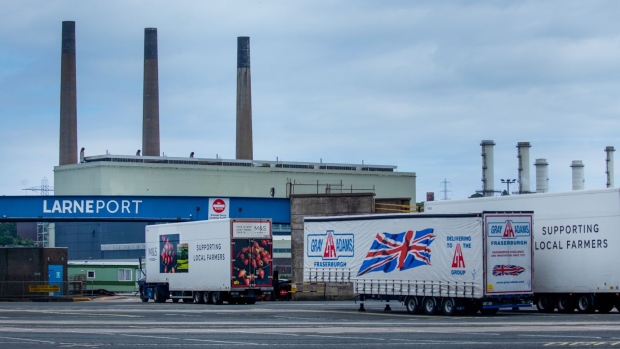Nov 8, 2022
UK-EU Northern Ireland Deal ‘Doable’ by Year-End, Coveney Says
, Bloomberg News

(Bloomberg) -- Rishi Sunak’s rise to power in the UK presents a new opportunity to resolve its standoff with the European Union over Northern Ireland’s trade arrangements, with a negotiated settlement “doable” by the end of the year, Ireland’s Foreign Minister said.
The EU still has its red lines in talks over the Northern Ireland Protocol -- the part of the Brexit deal that deals with the region’s trade -- and will be “very firm” in terms of protecting the integrity of its single market, Simon Coveney said in Dublin. But he also said he detects “a real intent in London to try to resolve the protocol issues through negotiation.”
“The EU will respond to that generously” and is “willing to show significant flexibility” in the implementation of the Brexit deal, Coveney said on Tuesday in a briefing with European journalists. “I think that’s doable and I think it’s doable by the end of the year,” so long as there’s “an honest and significant focus on a negotiated outcome.”
The stalemate in talks over the protocol -- which the UK says unnecessarily bogs down trade between mainland Great Britain and Northern Ireland -- has dragged on for months. It’s also become an obstacle to the formation of a regional government amid a refusal by the Democratic Unionist Party to join the power-sharing executive until the protocol is scrapped.
The failure to form a government following an election in May means that legally, the UK government must call a fresh vote in the region within 12 weeks of October 28. But Secretary of State for Northern Ireland Chris Heaton-Harris last week unexpectedly ruled out calling one this year, citing concerns from businesses, political parties and the community. The UK will announce a plan on Wednesday to extend the deadline to allow time to strike a deal on the protocol, people familiar with the matter said Monday.
UK Unexpectedly Rules Out December Election in Northern Ireland
The current expectation is that the vote will be held in late February, to try to ensure the Northern Ireland executive is up and running well before the April anniversary of the region’s 1998 peace deal. Irish Premier Micheal Martin told Bloomberg Television on Tuesday that the delay means avoiding “perhaps an election in the short term that could prove to be more polarizing than previous elections.”
Coveney said it’ll also give post-Brexit negotiations space to progress. “To push a potential election back into next year to give some space for us to try to resolve some of the other issues, I think is a sensible way forward,” he said.
The root of the standoff is the decision to keep Northern Ireland in the bloc’s single market -- which both sides agreed was necessary to avoid a border on the island of Ireland. But it angered unionists who say it undermines Northern Ireland’s trade and political ties to the rest of mainland Britain.
--With assistance from Kevin Whitelaw.
©2022 Bloomberg L.P.







